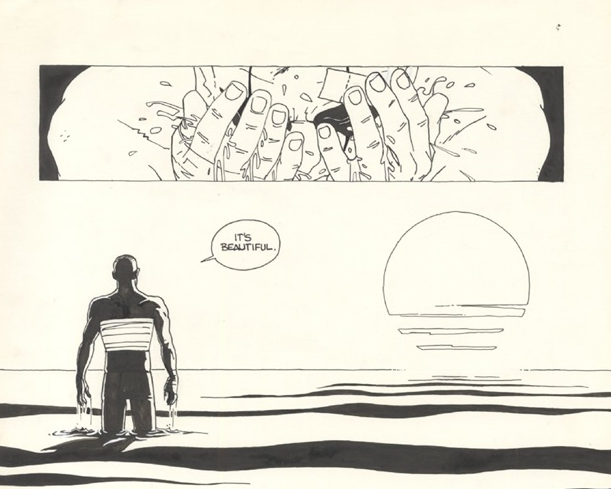 Written by Nicolas Mahler
Written by Nicolas MahlerIllustrated by Nicolas Mahler
Top Shelf
An aging racer's life is slowly going into decline. He can only afford a small home, his wife is most likely dying, he can't concentrate on his semi-relationship with a former model past her prime, and his friends are boozers whose best days are long past them. He's still trying, but the next generation is too extreme for him to compete.
Our racer is at a crossroads in his life, but what will the next step take? Will he keep trying to turn the corner, or accept an offer to move into a life of crime? Ultimately, does it even matter? That's the problem when you're a Lone Racer.
Normally, this is not a book I'd choose to review these days. I read it awhile ago, it's older (from 2006), and it's not part of a series or by one of my favorite authors. Heck, even the subject (car racing) is far from near and dear to me. Nothing about this book screamed out for a review, so why did I do it?
The answer is that this book packs a great story into an easygoing, flowing narrative style where we never do even learn the protagonist's name. He's every racer who ever stayed on a few too many tracks, every baseball player trying for one last shot and finishing with a sub-par batting average or high runs against average, and every football player that hangs around training camp after getting cut over and over again. The sport doesn't matter, because you can easily recognize this lone racer in a variety of forms--and that's part of what makes it work so well.
The other key to this book's quality is the humanity of the main character. He's not vain beyond normal standards. He's not out to beat the odds or be a superhero. This is a guy whose life is falling apart to the point that he seriously considers robbing a bank. He's as ordinary as anyone whose best years are behind them, and it's easy to relate to his struggles.
That's what makes the ending of the book so satisfying. Because the lone racer is a common guy, we can easily see him failing or succeeding, and the book works fine either way. The ultimate fate of the racer is even left up to the reader, his last line closing things perfectly while leaving it up to you to decide if he's changed his life or not by the end. I love a book that can manage to both give us closure and also leave us thinking as we close the pages. Lone Racer does that in a way I don't see very often.
Mahler's illustrations in this book are quite primitive, but they work for the narrative. The racer is just another guy and his world is rounded and dull. The illustrations ebb and flow as needed, with no worries about proportion or skill. The story does the work here, with Mahler's lines giving us what we need to see, minus any bells and whistles. It's a style that's not going to work for everyone (and certainly not for every book), but it meshes well with the story being told here.
Lone Racer is a book I don't think most people would grab if they saw it on the shelf, which is a shame. It's a gem of a story in a small package that shows the story of what it's like to age and to need to start giving up the dreams of youth. The challenges the racer faces are familiar--perhaps all too familiar for some--and Mahler's presentation of the challenges is brilliant. Lone Racer is a good book for anyone, but I think works especially well if you find yourself trying just a bit too hard sometimes to keep the magic of your youth, whenever that time was for you. If you see this book, don't hesitate to grab it. I think you'll be glad you did.







